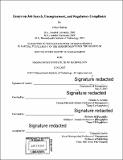| dc.contributor.advisor | Thomas A. Kochan and Roberto M. Fernandez. | en_US |
| dc.contributor.author | Başbuğ, Gökçe | en_US |
| dc.contributor.other | Sloan School of Management. | en_US |
| dc.date.accessioned | 2017-10-30T15:28:47Z | |
| dc.date.available | 2017-10-30T15:28:47Z | |
| dc.date.copyright | 2017 | en_US |
| dc.date.issued | 2017 | en_US |
| dc.identifier.uri | http://hdl.handle.net/1721.1/112038 | |
| dc.description | Thesis: Ph. D., Massachusetts Institute of Technology, Sloan School of Management, 2017. | en_US |
| dc.description | Cataloged from PDF version of thesis. | en_US |
| dc.description | Includes bibliographical references. | en_US |
| dc.description.abstract | This dissertation is composed of four essays, each studying limits to the means that are famously known to be effective. In the first essay, I investigate the effect of using social ties on the quality of opportunities pursued in job search. Using fixed effects models, I show that when the job seeker uses contacts, she pursues jobs that pay less than the jobs she pursues through formal methods. In addition, the analysis show that networks limit the geographical and occupational diversity of jobs pursued. In the second essay, using a mixed methods approach I examine how the negative emotional toll of long-term unemployment (LTU) is shaped by the interaction of gender and marital status. The interviews reveal a pattern with more marital tensions that exacerbate the emotional toll of LTU reported by married men than married women. The analysis of survey data show that overall marriages are helpful to the wellbeing of both unemployed men and women. Yet, for married men but not for married women, the analysis revealed that the significance of the benefits derived from marriage disappears once household income is controlled. The third essay examines whether introducing choice into a mandatory training program makes any difference in Unemployment Insurance recipients' job search performance. Using a field experiment design, I compare job search outcomes of individuals who have unconstrained workshop choices to others who only have a constrained option. Analyses show that providing the option of selecting which workshop to attend does not improve outcomes for unemployed. In the fourth essay, using data from safety inspections in laboratories at a large university, I investigate whether conducting semi-annual inspections and reporting findings back to responsible constituencies decreases the number of violations. The analyses show that the Environmental, Health, and Safety Management System did not reduce the number of violations. Rather, the results show a widening gap between compliant and non-compliant scientists. Using both lab-level quantitative data and interviews with inspectors and EHS personnel, I delineate the factors that impede the success of the system. | en_US |
| dc.description.statementofresponsibility | by Gökçe Başbuğ. | en_US |
| dc.description.tableofcontents | 1. Do Social Networks Lead to Better Opportunities to Pursue? Evidence from Job Applications -- 2. The Emotional Toll of Long-Term Unemployment: Examining the Interaction Effects of Gender and Marital Status -- 3. Activation Programs for Unemployed Insurance Recipients: Comparison of Two Training Delivery Formats -- 4. Why Is Regulatory Compliance Difficult? Variable Performance and the Insulation of Economically Resourceful Actors. | en_US |
| dc.format.extent | 146 pages | en_US |
| dc.language.iso | eng | en_US |
| dc.publisher | Massachusetts Institute of Technology | en_US |
| dc.rights | MIT theses are protected by copyright. They may be viewed, downloaded, or printed from this source but further reproduction or distribution in any format is prohibited without written permission. | en_US |
| dc.rights.uri | http://dspace.mit.edu/handle/1721.1/7582 | en_US |
| dc.subject | Sloan School of Management. | en_US |
| dc.title | Essays on job search, unemployment, and regulatory compliance | en_US |
| dc.type | Thesis | en_US |
| dc.description.degree | Ph. D. | en_US |
| dc.contributor.department | Sloan School of Management | |
| dc.identifier.oclc | 1006384870 | en_US |
